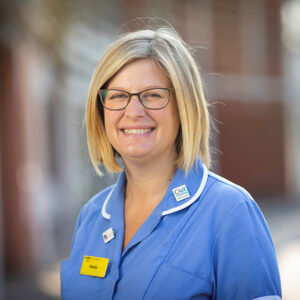No results could be found
Published: 1 September 2021
Team take first step in a new way of working
Small changes in the way decisions are taken have made a big difference to one of our community nursing teams; helping to boost colleagues’ confidence and improving care for our patients.
John, 82, (not his real name), is housebound, lives alone and has short-term memory difficulties. When our Charing Community Nursing Team visited him for his daily insulin injections, he was usually in bed. His blood sugars fluctuated, but were often high and were not improving.
The team discussed what John needed and came up with a plan involving everyone who looks after him, which allowed him to make better choices, without taking away his independence.
They spoke to John’s carers who added more protein and fruit to his shopping, and swapped treats for ones with less sugar. The team spoke to the diabetic nurse at his local GP practice to change his medication dosage and add a weekly injection.
A student nurse on placement saw John before the team joined up his care, and again nine weeks later and saw a significant change. John was out of bed, more alert, making better food choices and his blood sugar levels had greatly improved.
How small changes made a big difference
 Paula Theobald, Local Care Assistant Practitioner, says since joining the Transforming Integrated Care in the Community (TICC) programme they have learned to look at their patients’ care more deeply.
Paula Theobald, Local Care Assistant Practitioner, says since joining the Transforming Integrated Care in the Community (TICC) programme they have learned to look at their patients’ care more deeply.
She said: “We have learned to work in a different way since starting the programme. Being a part of a self-managed team has enabled us to be more proactive and take more responsibility. In this situation, the untrained members of the team acted to help John to have a better quality of life. We didn’t just follow a pattern, we observed something wasn’t right, so took it upon ourselves to do something about it.
“We had 100 per cent trust between us from our first session of reimagine team working, which was great, everyone feels comfortable and safe to talk.”
So, what is it?
TICC uses a coaching approach to encourage teams to make suggestions, take decisions and find solutions to challenges – helping to build stronger partnerships and improve care for their patients and focusing on holistic health and wellbeing.
The seven-strong Charing team make time for discussions whether or not they’re physically together. They know all the patients on the team’s caseload, not just their own, and all wear the same uniform, regardless of their job title.
It’s not just Paula who has seen the benefits of the programme, the whole team are now fully committed.
Healthcare assistant Helen Curley said: “I have been in the NHS for 23 years. This is my first year of clinical experience and it’s been great, my confidence has really grown.”
The process isn’t always easy, but the team say it’s been the key to their success and improved patient care. It’s also helped individual team members increase their confidence and communication with each other.
The programme has completely changed Paula’s outlook and the way she deals with confrontation. She said: “I’ve had to learn if I’m not happy about something, to talk to the person and approach it in a kind way. I wouldn’t have dealt with it at all before, now I do. I feel safe with the team and if I had a problem I know I could approach any one of them for help.”
Paula has improved her self-confidence in community nursing and says she feels safe to ask anyone in her team for help, without fear of judgement. “I’d always wanted a job in community nursing but I nearly ran out of my interview. I was a bubbly and easy-going person but I lost my confidence after having children and I felt people didn’t listen to me as I was a lower grade,” she said.
“I’m so glad I joined KCHFT, we have such a lovely team and I am so happy in my job.
“The hierarchy doesn’t exist here, we all wear the same uniform and we like that. We explain it to patients and we work within our competency but our patients see we are one team, not who is the most senior. Reimagine team working has done me the world of good.”



